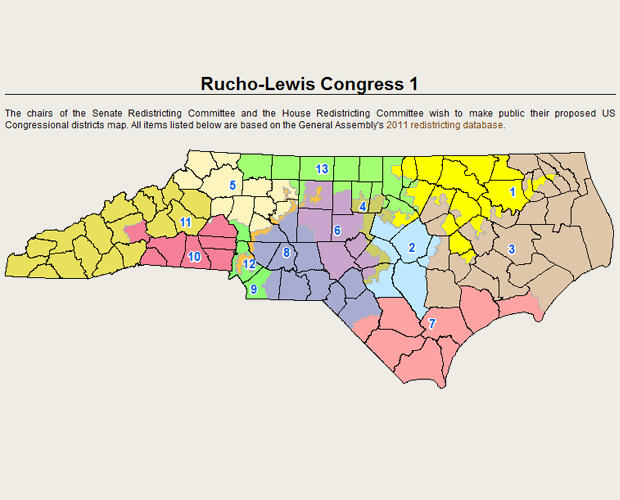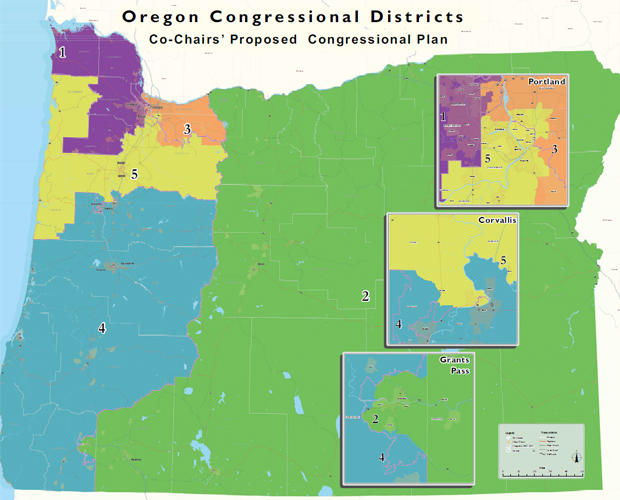Redistricting Journal: GOP could win big in North Carolina
Updated July 14, 1:30 p.m. ET
Mark Gersh is president of NCEC Services Inc., and a CBS News Consultant. Redistricting Journal is a regular Hotsheet series on redistricting battles across the country.
Since the last update, state legislatures three states - Michigan, North Carolina and Oregon - have passed redistricting plans. We are still waiting for the non-partisan commission in California to approve a plan that may radically change the boundaries of the 53 seat congressional delegation.
Not surprisingly, there has been a partisan divide over which party is benefiting from redistricting plans to date. Democrats argue that favorable maps in Illinois and the anticipated California plan will enable them to avoid the substantial losses that were predicted early in the process. Republicans counter that their ability to shore up vulnerable freshmen members in several states - most notably Pennsylvania, Michigan and Ohio - will make secure the majority they garnered in the last election. Republicans also contend that the North Carolina map will pay huge dividends, almost offsetting Democratic gains in Illinois.
Here is a synopsis of the new maps in North Carolina, Michigan and Oregon:
NORTH CAROLINA: Ironically, Republicans capitalized on the success of all but one Democratic incumbent, Bobby Etheridge (2nd district), to survive last year's landslide. The GOP strategy: construct more unfriendly districts for three Democrats - Mike McIntyre (7th district) Larry Kissell (8th) and Heath Shuler (11th) - and drastically alter the boundaries of the 13th district represented by Democrat Brad Miller.
Overall it may enable them to gain four seats. One caveat: both McIntyre and Shuler have shown strong ability to attract support from conservative independents and Republicans. The Republicans also helped their most vulnerable member - freshman Rep. Renee Ellmers. Ellmers is now a strong favorite to win reelection, after his surprise victory in 2010. Democrats also saw a multitude of Republican voters removed from three safe Democratic districts - GK Butterfield (1st) David Price (4th) and Mel Watt (12th).
In an example of the power the unintended consequences, a Republican legislature passed this redistricting bill with no prospect of a gubernatorial veto from Democratic Governor Beverly Perdue. Why? Many years ago, a Democratic legislature passed a law prohibiting a gubernatorial veto of congressional redistricting legislation. At the time, a Republican governor occupied the office.
Moreover, Democratic Rep. Brad Miller, who lost his Democratic base in Greensboro, was one of the architects of a 2001 Democratic gerrymander, while serving in the state legislature.
Democrats have vowed to file a series of legal challenges, primarily dealing with Voting Rights Act concerns. Until legal action is exhausted or successful, we will assume that the Republicans will gain 2-4 seats in the Tar Heel state.
Also note that the North Carolina plan still has to be pre-cleared by Justice Department, and that will be submitted on August 1st, and it has to formally pass the legislature.
MICHIGAN: The state lost one seat due to anemic population growth. Republicans control the legislature and governorship, and combined two Democrats - Gary Peters (9th) and Sander Levin (12th) into one district. This move may produce a contentious primary between the two. However, Levin previously represented about four times as many constituents who now sit in the reconstructed district, and so that gives a strong edge.
A second motivation for the Republicans here was to protect their vulnerable members. This strategy is a cornerstone of Republican initiatives in several states where they scored major gains in 2010. In Michigan, Republicans gained two seats in 2010: the 1st district won by freshman Dan Benishek, and the 7th, regained by Tim Walberg. Thirdly, the Republicans shored up habitually vulnerable Thad McCotter in the new 11th district. McCotter, of course, has launched a long-shot presidential bid that may have implications for him back home.
In the new map, the Republicans probably accomplished at least two of their three objectives. Bensihek is slightly more secure in the 1st district, gaining Grand Traverse County. Democrats contend that Benishek is still a target. Walberg's district has maintained its partisan balance. However, the boundaries were sharply altered, presumably to discourage another bid from Schauer. Battle Creek is out of the district, but Democratic leaning Monroe County has been added.
McCotter may have been the big winner among incumbents. By gaining solidly Republican parts of Oakland County, Democratic voting strength has been diminished by as much as percent.
Accordingly, Democrats are almost certain to lose one seat in Michigan (Levin-Peters), and have diminished prospects for regaining seats lost in the last election.
CBSNews.com special report: Election 2012
OREGON: Democrats currently hold a 4-1 advantage in this 5 seat delegation. While the partisan divide may remain the same, Republicans have a better chance to unseat Democrat Kurt Schrader, either now or in the future. Schrader, the freshman member from the 5th district, lost Coravallis, a heavily Democratic university community around Oregon State. In return, Schrader picked up faster-growing segments of Clackamas County, such as Milwaukie, Sunnyville and Mt. Scott, currently part of the safe Democratic 3rd district.
A debate over demographic effects has emerged, with Democrats asserting that the transition from rural to suburban areas of Clackamas will translate into more favorable territory for them. They contend that a similar trend was discernible in Washington County: 25 years ago there were no Democratic officials there, but now a majority are Democrats.
The other three Democrats and one Republican are expected to win reelection. However, 1st district Democrat, David Wu, also lost friendly territory, and 4th district Democrat Peter DeFazio survived a tough race in 2010 and could face another formidable challenger in 2012. Most of the action, however, is anticipated in the 5th district, both in 2012 and in years to come.
More Redistricting Coverage in Hotsheet:
Redistricting puts many California seats in play
Iowa races could be among 2012's most competitive
Indiana redistricting bolsters GOP prospects
Dems seek big gains after Illinois redistricting

